- Home
- David Gemmell
Shield of Thunder t-2
Shield of Thunder t-2 Read online
Shield of Thunder
( Troy - 2 )
David Gemmell
The second novel in David Gemmell’s bestselling Troy trilogy. Interlacing myth and history, and high adventure, this is epic storytelling at its very best.
War is looming, and all the kings of the Great Green are gathering, each with their own dark plans of conquest and plunder.
Into this maelstrom of treachery come three travellers: Piria, a runaway priestess nursing a terrible secret; Kalliades, a warrior with high ideals and a legendary sword; and his close friend Banokles, who will carve his own legend in the battles to come.
Together they journey to the fabled city of Troy, where a darkness is falling that will eclipse the triumphs and personal tragedies of ordinary mortals for centuries to come.
Shield of Thunder
David Gemmell
PROLOGUE
A cold wind blew down from the snow-covered mountains, hissing through the narrow streets of Thebe Under Plakos. Snow was falling in icy flurries from the dark clouds massing over the city. Few citizens were on the streets that night, and even the guards at the palace huddled close to the gate, their heavy woolen cloaks drawn tightly around them.
Inside the palace there was an air of increasing panic as the pain-filled day drifted into a night of screams and anguish. People gathered, silent and fearful, in the cold corridors. Every now and again there came a flurry of activity as servants ran from the queen’s bedchamber to fetch bowls of water or fresh cloths.
Close to midnight the hooting of an owl could be heard, and the waiting courtiers glanced at one another. Owls were birds of ill omen. All knew that.
The cries of pain began to fade to soft moans, the queen’s strength all but gone. The end was close. There would be no joyous birth, only death and mourning.
The Trojan ambassador, Heraklitos, tried to maintain an air of heavy concern. It was not easy, for he had not met Queen Olektra and cared nothing if she lived or died. And despite his ambassador’s robes of white wool and the long sheepskin cloak, he was cold, his feet numb. He closed his eyes and tried to warm himself with thoughts of the riches he would earn from this journey.
His mission in Thebe Under Plakos had been twofold: to secure the trade routes and to deliver gifts from Troy’s young king, Priam, thus establishing a treaty of friendship between the neighboring cities. Troy was growing fast under Priam’s inspirational leadership, and Heraklitos—like many others—was growing wealthier by the day. However, many of the most valuable trade goods—perfumes, spices, and cloths embroidered with glittering gold thread—had to be carried through war-torn eastern lands ravaged by roving bands of brigands or deserters. Outlaw chiefs held the high passes and demanded taxes from caravans traveling through. Priam’s soldiers had cleared many of the routes close to Troy, but to the south, in Thebe, beneath the shadow of mighty Mount Ida, it was King Ektion who ruled. Heraklitos had been sent to encourage the king to gather more troops and campaign against the brigands. The mission had been succesful. Even now Ektion was raiding deep into the mountains, destroying bandit towns and clearing the trade routes. All that remained was for Heraklitos to offer congratulations on the birth of the new babe, and then he could journey back to his palace in Troy. He had been away too long already, and there were many pressing matters awaiting him.
The queen had gone into labor late the previous day, and Heraklitos had ordered his servants to be ready to depart early this morning. Yet here he was, at midnight on the second day, standing in a drafty corridor. Not only had the promised babe failed to arrive, Heraklitos could tell from the fearful looks on the faces of the people around him that a tragedy was looming. Priests of Asklepios, the god of healing, had been called for, and they had scurried into the royal apartments to aid the three midwives already in attendance. A bull was being sacrificed in the courtyard below.
Heraklitos had no choice but to stand and wait. To leave would be seen as a sign of disrespect. It was most annoying, for when the unfortunate woman died, the city would go into mourning, and Heraklitos would be obliged to wait days for the funeral.
He saw a hawk-faced old woman staring at him. “A sad, sad day,” he said solemnly, trying to muster a tone of infinite sorrow. He had not seen her arrive, but she was standing now, leaning on a carved staff, her expression set, her eyes dark and fierce, her white hair uncombed and framing her head like a lion’s mane. She was wearing a long gray robe, an owl embroidered upon the breast with silver thread. A priestess of Athene, then, he thought.
“The child will not die,” she said, “for she has been blessed by the goddess. Though the queen will if these fools do not call upon me.”
A thin, round-shouldered priest left the queen’s bedchamber. He saw the hard-faced woman and dipped his head in greeting. “I fear the end is close, Great Sister,” he said. “The child is breeched.”
“Then bring me to her, idiot.”
Heraklitos saw the priest redden, but he stepped back, beckoning the woman forward, and they returned to the bedchamber. A tough old crow, Heraklitos thought. Then he recalled that the priestess had spoken of the babe as “she.” A seeress, then—or believed she was. If she was right, then the wait was even more galling. Who cared if a girl child lived or died? Or even a boy, he thought glumly, since King Ektion already had two strong young sons.
The night wore on, and Heraklitos and some twenty others waited for the inevitable sound of wailing that would herald the queen’s death. But then, just as the dawn broke, there came the birth cry of a newborn. The sound, so full of life, brought to the jaded ambassador a sudden sense of joy, an uplift to the spirit he would not have thought possible.
A short while later the courtiers, Heraklitos among them, were led into the queen’s apartments to greet the new arrival.
The babe had been laid in a crib at the bedside, and the queen, looking pale and exhausted, was resting against embroidered cushions, a blanket across her lower body. There was a great deal of blood on the bed. Heraklitos and the others gathered around silently, holding their hands over their hearts in a gesture of respect. The queen did not speak, but the priestess of Athene, her hands caked with drying blood, lifted the infant from the crib. It gave a soft, gurgling cry.
Heraklitos saw what at first appeared to be a smear of blood upon the child’s head, close to the crown. Then he realized it was a birthmark, almost perfectly round, like a shield, but with a jagged white line of skin running through it. “As I prophesied, it is a girl,” said the priestess. “She has been blessed by Athene. And here is the proof,” she added, tracing her fingers across the birthmark. “Can you all see it? It is Athene’s shield—the Shield of Thunder.”
“What will be her name, Highness?” asked one of the courtiers.
The queen stirred. “Paleste,” she whispered.
The following day Heraklitos left on the long journey back to Troy, bearing news of the birth of the princess Paleste and the more important tidings of a treaty between the two cities. He was not, therefore, present when King Ektion returned and went to his wife’s bedside. The king, still in battle armor, leaned over the crib and reached inside. A tiny hand came up toward his. Extending a finger, the king laughed as the babe gripped it tightly. “She has the strength of a man,” he said. “We shall name her Andromache.”
“I have given her the name Paleste,” his wife said.
The king leaned down and kissed her. “There will be more children if the gods will it. The name Paleste can wait.”
For Heraklitos the next nineteen years proved rich and fulfilling. He journeyed south to Egypte, east to the center of the Hittite empire, and northwest through Thraki and Thessaly and down to Sparta. All the while he grew richer. Two wives
had borne him five sons and four daughters between them, and he had been blessed by the gods with good health. His wealth, like that of Troy, had grown steadily.
But now his luck had run out. It had begun with a steadily increasing pain in his lower back and a hacking dry cough that would not leave him even in the warmth of the summer sun. His flesh had melted away, and he knew that the Dark Road was approaching. He struggled on, still seeking to serve his lord, and was called one night to the royal apartments, where King Priam and his wife, Hekabe, had been consulting a seer. Heraklitos did not know what the man had prophesied, but the queen, a fierce and ruthless woman, seemed in a high state of tension.
“Greetings, Heraklitos,” she said without any reference to his weakness or concern for his health. “Some years back you were in Thebe Under Plakos. You talked of a child born there.”
“Yes, my queen.”
“Tell me again.”
So Heraklitos told the tale of the babe and the priestess. “You saw the Shield of Thunder?” asked Hekabe.
“I did, my queen, red and round with a white streak of lightning through the center.”
“And the child’s name?”
The question took the dying man by surprise. He had not thought of that day in years. He rubbed at his eyes and saw again that cold corridor, and the lion-haired priestess, and the pale, exhausted queen. Then it came to him.
“Paleste, Highness.”
CHAPTER ONE
A BLACK WIND RISING
Penelope, queen of Ithaka, understood the nature of dreams and the portents and omens that dogged men’s lives. So she sat on the beach, a gold-embroidered shawl around her slender shoulders, and glanced at the sky from time to time, watching for passing birds and hoping for a better omen. Five swallows would predict a safe journey for Odysseus, two swans good fortune; an eagle would indicate a victory—or, for Odysseus, a trading success. But the skies were clear. A light wind sprang from the north. The weather was perfect for sailing.
The old galley had been repaired, debarnacled, and recalked ready for spring, but new timbers and a coat of fresh paint could not conceal her age, which showed in every line as she lay half in and half out of the shallow water.
“Build a new ship, Ugly One,” she had told her husband countless times. “This one is old and tired and will be your downfall.” They had argued about it for years. But in this she had no power to sway him. He was not by nature a sentimental man; his affable demeanor hid a core of bronze and horn, yet she knew he would never replace the old ship he had named after her.
Penelope sighed, a gentle sadness settling over her. I am that ship, she realized. I am getting old. There is gray in my hair, and the time is swiftly passing. But more significant than the fading of her chestnut hair or the increasing lines upon her face, the monthly flows of blood that indicated youth and fecundity were becoming less frequent. Soon she would be past childbearing age, and there would be no new sons for Odysseus. The sadness deepened into sorrow as she remembered pale Laertes and the fever that had melted away his flesh.
On the beach Odysseus was striding angrily around the galley, his face red, arms gesturing, bellowing at his crewmen, who hurried to load the cargo. There was a sorrow among the men, too; she could feel it as she watched them. A few days previously their comrade Portheos, whom they called Portheos the Pig, a fat, jovial, and popular young man who had sailed with the Penelope for many summers, had died. His young wife, pregnant with their fourth child, had awoken at dawn to find Portheos dead on their pallet bed beside her.
On the Penelope two crewmen were hauling on a heavy bale of the brushwood used for packing cargo in the hold. Suddenly one lost his grip and stumbled, and the other was catapulted into the sea after the stack of wood. Odysseus swore colorfully and turned to his wife, raising his arms in a gesture of despair.
Penelope smiled, her spirits lifting as she watched him. He was always happiest when about to leave for foreign shores. Throughout the spring and summer he would roam the Great Green, buying and selling, telling his stories, meeting kings and pirates and beggars.
“I’ll miss you, lady,” he had told her the previous night as she lay in his arms, her fingers gently curling into the red-gray hair of his chest. She had made no reply. She knew when he would remember her—at each night’s fall, when the dangers of the day had passed, he would think of her and miss her a little.
“I will think of you every day,” he added. Still she said nothing. “The pain of your absence will be a constant dagger wound in my heart.”
She smiled against his chest and knew he felt the smile.
“Don’t mock me, woman,” he said fondly. “You know me too well.”
On the beach in the dawn light she watched him as he stomped across the sand to speak to Nestor, king of Pylos and her kinsman. The contrast between the two men was remarkable. Odysseus, barrel-chested, loud, and angry, attacked each day as if it were a mortal enemy. Nestor, slim, gray, and stooped, was a small point of calm in the storm of activity on the beach. Although Nestor was only ten years older than her husband, he had the demeanor of an ancient; Odysseus was like an excited child. She loved him, and her eyes pricked with unaccustomed tears for the journeys and perils he faced.
He had returned to her only a few days before, accompanied by Nestor, after a reluctant voyage to Sparta at the request of Agamemnon, king of Mykene.
“Agamemnon is intent on revenge,” old Nestor had said, sitting in the megaron late in the evening, a cup of wine comfortably full in his grip, one of his hounds at his feet. “The meeting at Sparta was a failure for him, yet he will not be diverted from his path.”
“The man is obsessed,” Odysseus said. “He summoned the kings of the west and talked of alliance and peace. Yet all the while he dreams of a war with Troy—a war he can only fight if we all join with him.”
Penelope heard the anger in his voice. “Why would any join him?” she asked. “His hatred for Troy is a private matter.”
Nestor shook his head. “There are no private matters for the Mykene king. His ego is colossal. What touches Agamemnon touches the world.” He leaned forward. “Everyone knows he is angry at being thwarted by Helikaon and the traitor Argurios.”
“The traitor Argurios, is it?” Odysseus snapped. “Interesting what makes a man a traitor, is it not? A fine warrior, a man who had faithfully served Mykene all his life, was declared outlaw and stripped of his land, possessions, and good name. Then his king tried to have him killed. Treacherously, he fought for his life and that of the woman he loved.”
Nestor nodded. “Yes, yes, kinsman. He was a fine warrior. Did you ever meet him?”
Penelope knew he was seeking to defuse Odysseus’ anger. She masked a smile. No one with any sense wanted to see Odysseus in a fury.
“Aye, he sailed with me to Troy,” Odysseus replied. “An unpleasant man. But every one of those Mykene would have been slaughtered at Priam’s palace had it not been for Argurios.”
“As it was, they were slaughtered when they returned home,” Penelope added quietly.
“It was called the Night of the Lion’s Justice,” Nestor said. “Just two escaped, and they were declared outlaw.”
“And this is the king you wish to support in a war?” asked Odysseus, swigging mightily from his wine cup. “A man who sends valiant warriors to fight his battles and then murders them when they fail?”
“I have not yet offered ships or men to Agamemnon.” The old man stared into his wine cup. Penelope knew that Nestor had not argued against a war but had kept his own counsel among the kings gathered at Sparta. “However, Agamemnon’s ambitions affect everyone,” he said at last. “With him you are either friend or foe. Which are you, Odysseus?”
“Neither. All men know I am neutral.”
“Easy to be neutral when you have secret supplies of wealth,” said Nestor. “But Pylos depends on trading its flax up into Argos and the north. Agamemnon controls the trade routes. To go against him would be ruinous.
” He glanced at Odysseus, and his eyes narrowed. “So tell me, Odysseus, where are these Seven Hills that are making you rich?”
Penelope felt the tension in the room rise, and she glanced at Odysseus.
“On the edge of the world,” Odysseus replied, “and guarded by one-eyed giants.”
Had Nestor not been drinking heavily, he would have noticed the harsh edge in Odysseus’ reply. Penelope took a deep breath, preparing herself to intervene.
“I would have thought, kinsman, that you might have shared your good fortune with others of your blood rather than a foreigner,” Nestor said.
“And I would have,” Odysseus said, “save that the foreigner you speak of discovered the Seven Hills and opened up the trade route. It is not for me to share his secrets.”
“Only his gold,” Nestor snapped.
Odysseus hurled his wine cup across the room. “You insult me in my own palace?” he roared. “We had to fight for the Seven Hills against brigands and pirates and painted tribesmen. That gold was hard-won.”
The angry atmosphere lay thick in the megaron, and Penelope forced a smile. “Come, kinsmen. You sail for Troy tomorrow for the wedding feast and games. Do not let this night end with harsh words.”
The two men looked at each other. Then Nestor sighed. “Forgive me, old friend. My words were ill advised.”
“It is forgotten,” Odysseus said, gesturing at a servant to bring him another cup of wine.
Penelope heard the lie in the words and knew that Odysseus was still angry. “At least in Troy you will be able to forget Agamemnon for a while,” she said, seeking to change the subject.
“The western kings are all invited to see Hektor wed to Andromache,” Odysseus said glumly.
“But Agamemnon will not be there, surely?”
“I think he will, my love. Sly Priam will use the opportunity to bend some of the kings to his will. He will offer them gold and friendship. Agamemnon cannot afford not to go. He will be there.”

 Bloodstone
Bloodstone White Wolf
White Wolf Wolf in Shadow
Wolf in Shadow Last Sword of Power
Last Sword of Power Dark Moon
Dark Moon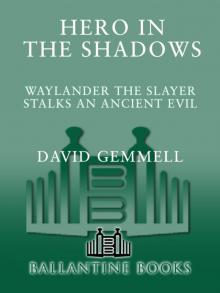 Hero in the Shadows
Hero in the Shadows Gemmell, David - Drenai 09 - Hero In The Shadows
Gemmell, David - Drenai 09 - Hero In The Shadows Waylander
Waylander Shield of Thunder
Shield of Thunder Stormrider Stormrider
Stormrider Stormrider Ghost King
Ghost King Legend
Legend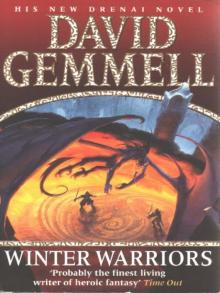 Winter Warriors
Winter Warriors Fall of Kings
Fall of Kings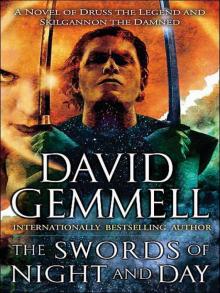 The Swords of Night and Day
The Swords of Night and Day The King Beyond the Gate
The King Beyond the Gate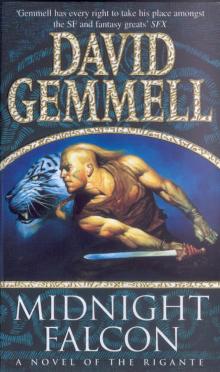 Midnight Falcon
Midnight Falcon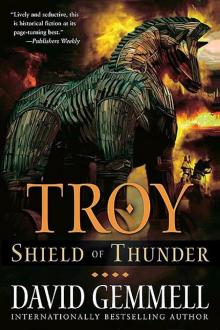 02 - Shield of Thunder
02 - Shield of Thunder In the Realm of the Wolf
In the Realm of the Wolf Ravenheart
Ravenheart The First Chronicles of Druss the Legend
The First Chronicles of Druss the Legend Last Guardian
Last Guardian Stormrider
Stormrider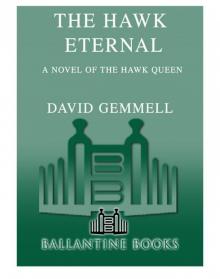 The Hawk Eternal
The Hawk Eternal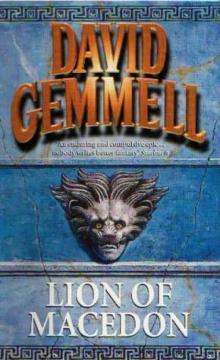 Lion of Macedon
Lion of Macedon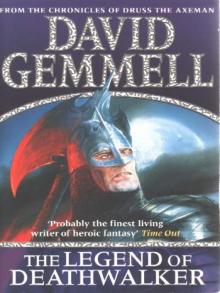 The Legend of Deathwalker
The Legend of Deathwalker Knights of Dark Renown
Knights of Dark Renown Echoes of the Great Song
Echoes of the Great Song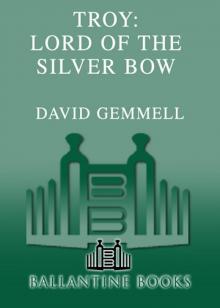 Lord of the Silver Bow
Lord of the Silver Bow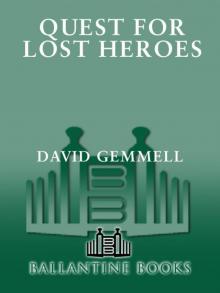 Quest for Lost Heroes
Quest for Lost Heroes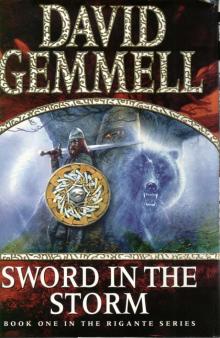 Sword in the Storm
Sword in the Storm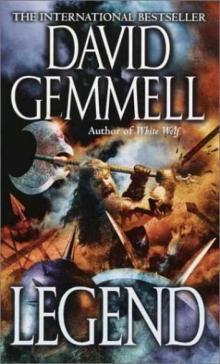 Drenai Saga 01 - Legend
Drenai Saga 01 - Legend White Knight/Black Swan
White Knight/Black Swan![[Troy 02] - Shield of Thunder Read online](http://i1.bookreadfree.com/i/03/19/troy_02_-_shield_of_thunder_preview.jpg) [Troy 02] - Shield of Thunder
[Troy 02] - Shield of Thunder Lord of the Silver Bow t-1
Lord of the Silver Bow t-1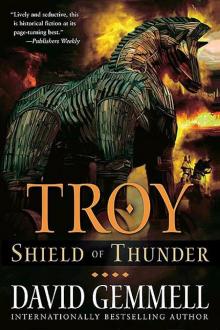 Shield of Thunder t-2
Shield of Thunder t-2 White Wolf: A Novel of Druss the Legend dt-10
White Wolf: A Novel of Druss the Legend dt-10 Drenai Saga 02 - The King Beyond the Gate
Drenai Saga 02 - The King Beyond the Gate Ironhand's Daughter
Ironhand's Daughter Gemmell, David - Drenai 06 - The First Chronicles of Druss the Legend
Gemmell, David - Drenai 06 - The First Chronicles of Druss the Legend The Last Guardian
The Last Guardian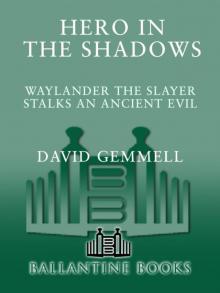 Hero in the Shadows: A Waylander the Slayer Novel
Hero in the Shadows: A Waylander the Slayer Novel The Legend of the Deathwalker
The Legend of the Deathwalker